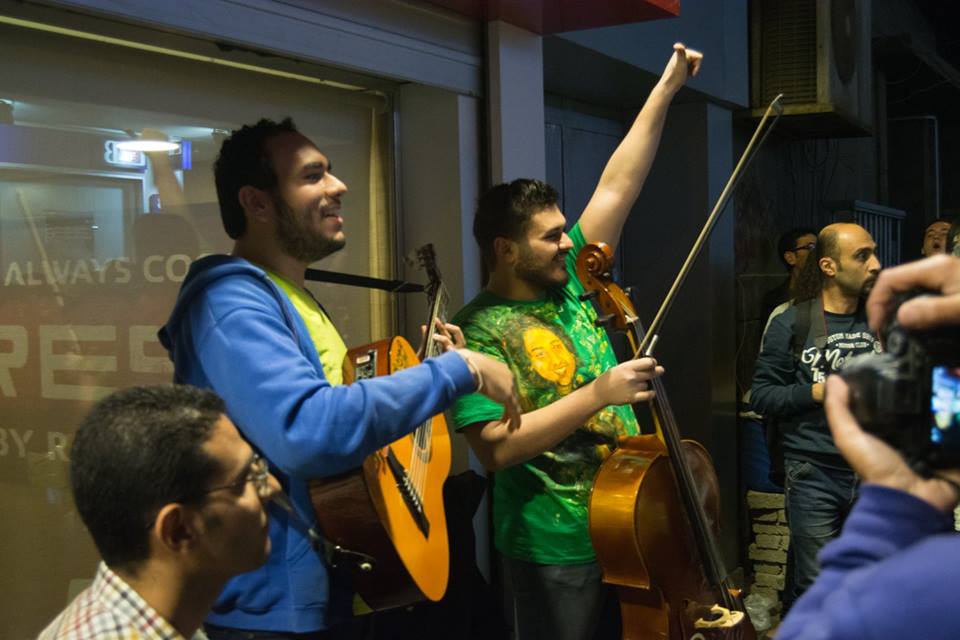When babies see the light for the first time in Egypt, love and care are not the only welcome reception they are met with; “El-Sobou’” (Egyptian baby shower) is a must celebration party to announce the family’s happiness with the newest member. As an inherited heritage from the pharaonic era, only a few people are aware of the history of every newborn’s anticipated celebration, a lack of information that “The Seven Seeds” book aimed to fill.
“El-Saba’ Habat” (The Seven Seeds) is a photography book by young Egyptian photographer Asmaa Gamal. Through the pages of the book, which take the reader to a traditional Egyptian baby shower, Gamal tells the stories of El-Sobou’ from the early ancient era to the modern forms of the tradition.
El-Sobou’, which means seven days in Arabic, is usually held on the baby’s seventh day on earth. Through the pictures of the book, readers explore the details of buying the contents of the celebration. It starts by following ladies during their Sobou’ shopping at the specific places selling sweets, food, candles, and gifts, which the baby’s family distributes to the party’s attendees.
“I’m passionate about documenting Egyptians’ daily lives on camera, especially when it comes to our forgotten heritage,” Gamal started her talk with a smile, adding that “the idea of the project started in 2014 when I noticed that El-Sobou’ is one of Egypt’s legacies that is not professionally captured by pictures for the upcoming generations.”
After spending months researching the history of the tradition, Gamal found that it goes back to ancient Egyptians. The tradition, which Egyptians still follow, is found drawn on papyrus. Yet, she found no photography project to state the evolution of the celebration over the years.
“When I started working on the project, my aim wasn’t to publish a book,” Gamal explained. “I just wanted a project that states everything related to El-Sobou’ in text and pictures from the past until now.”
Unlike many other cultural celebrations in Egypt, like Zar, Mouled, or even weddings, Sobou’ is not chronicled by any professional photographer, she added.
For three years, Asmaa attended tens of El-Sobou’ celebrations for families belonging to various social classes and captured their journey of preparing for the celebration. Her pictures, accompanied by the notes she has written and the interviews she has conducted, provide readers with informative details, as well as transfer the feelings of happiness and anticipation families have when welcoming the newest member.
“I found that Egypt is the only country in which the Christian baptism celebrations in the church are close to the “Aqeeqa” ceremony, which is the Islamic celebration, and both have the same festive social atmosphere. This is due to the fact that both of them have taken a lot from the Pharaohs.
In her journey of documentation, Gamal captured the carvings that tell how the pharaohs used to celebrate El-Sobou’. Stories tell that newborns were carried in a procession from their home to the Nile, where the baby’s grandmother threw seven morsels of porridge to the river’s spirits. Then, the face of both the mother and the baby was to be washed by the river’s water before candles were placed in a small skiff.
The legend says that the longer the candles remain, the more auspicious the baby’s life would be. Some of the rituals’ traces were found in a pharaonic text stating, “so that if he grows and water is poured on his hand, he becomes like the firstborn son of his father’s loins.”
The book also includes interviews with people who have been earning their living for years by selling the pieces needed for El-Sobou’.
The book is a part of a project called Photo Book Egypt, which is a series of photo books published by a leading photographer hub called “PHOTOPIA”. The project aims to offer photography enthusiasts and collectors an accessible and affordable non-digital platform to document extraordinary photography work.














